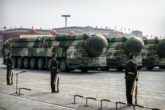December 13, 2019
Why policymakers and universities need to collaborate for democracy
Policymakers have singled out the higher education system as a critical area of vulnerability in American society. Christopher Wray memorably stated before the Senate Judiciary Committee that China now poses a “whole of society” threat to the United States. Reports on the trove of federal investigations into the Chinese theft of research from American medical schools is the latest confirmation of how pervasive the risk is.
Yet there is a fundamental disconnect between the way policymakers in Washington and university administrators across the country think and write about Chinese students in the United States. The proliferation of cultural education programs funded by the Chinese government along with other national security concerns have put policymakers on defense. American government policies and messaging have rightly focused on rooting out malign foreign influences on campuses and developing more targeted student visa screening processes to guard against espionage.
But the grave need for these kinds of solutions has debased the quality of the debate by pushing extreme solutions into the mainstream. Last year, the Trump administration seriously considered banning student visas to Chinese nationals, demonstrating a sharp departure from a principle that the federal government once fully embraced. American universities are uniquely positioned to advance democratic values at home and abroad. Two hallmark American postwar initiatives, the Fulbright Program and the Peace Corps, were created in response to fundamental national security threats and were grounded in the public principle that “people to people” exchanges are not simply diplomatic window dressing, but can play an important role in helping advance American strategic interests abroad.
Read the full article in The Hill.
More from CNAS
-
China May Grab a Lead in the Race for Military Fusion
This article was originally published in The Wall Street Journal. America’s top diplomat for nuclear-weapons issues, Undersecretary of State Thomas DiNanno, revealed this mont...
By David Feith
-
Indo-Pacific Security / Energy, Economics & Security
How to Win the Economic War with ChinaTrump's approach to China has run aground, giving Beijing unprecedented advantage in the economic conflict....
By Edward Fishman & Julian Gewirtz
-
America’s Self-Loathing Is a Losing Hand
This article was originally published in The Washington Post.Around 10 years ago, the United States began a historic shift in its grand strategy toward China, abandoning the b...
By David Feith
-
Indo-Pacific Security / Energy, Economics & Security / Technology & National Security
Selling AI Chips Won’t Keep China Hooked on U.S. TechnologyU.S. policy should not rest on the illusion that selling chips can trap China inside the American tech ecosystem....
By Janet Egan




